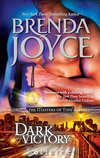Kitabı oku: «Dark Victory», sayfa 2
As they passed through the checkpoint, Sam and Kit were both so thoughtful that Tabby had the feeling they were ready to cut out on their plans for the afternoon. She would have to wander around the exhibit by herself, and return alone to the loft she shared with Sam. She’d float around it in the same solitude she did every night—except when she was out with some sweet guy she had no real interest in. It was lonely—Sam was almost never there—but she’d deal the same way she always did. She’d outline tomorrow’s curriculum, and then work on her spells.
“So which way to the Wisdom of the Celts?” Sam asked.
Tabby smiled back, relieved. Sam knew she needed company. “Up those stairs,” she said, nodding.
The huge front hall was terribly crowded. Every New Yorker knew that visiting the Met on the weekend was a really dumb idea. They started across the granite floored hall, dwarfed by the columns and arches, before going up the broad staircase to the first level of exhibits.
There was no line.
They exchanged looks as they approached the glass displays. Tabby said, “This is too weird. There should have been a half-hour wait, at least.”
Kit murmured, “It’s an exhibit on medieval Ireland. If you ask me, medieval Scotland and Ireland are peas in the same pod.”
Allie and Brie were in medieval Scotland, with Highlanders who belonged to a secret society dedicated to the protection of Innocence. “Are you saying that you think we’re meant to go in here? That the exhibit is related to the Brotherhood?”
“The earliest Scots came from Dalriada—which is Ireland.”
Tabby barely heard them. She realized her heart was thundering as she left them debating the odd lack of a line and walked over to a large glass display case. Inside, there were numerous artifacts and objects. She vaguely saw a large sword with an intricately designed hilt, and a pair of daggers, a brooch and a cup. But her gaze was drawn to the necklace there, instead.
A terrible tension filled her as she stared at the gold chain and the pendant hanging from it. It was a talisman in the shape of an open palm, a pale stone glittering from the palm’s center.
Tabby’s pulse skittered wildly in her throat. When she touched the hollow of her collarbone, where she wore pearls and a small key on a chain, her skin there felt far too warm. She felt a bit dizzy, faint.
“Are you all right?” Sam asked.
“I feel odd,” Tabby said, realizing she was perspiring. She leaned forward to read about the amulet.
It was dated to the early thirteenth century, but had been found in 1932 among the ruins of Melvaig Castle in the northeastern Highlands of Scotland. It had somehow survived the legendary battle of An Tùir-Tara, which meant the Burning Tower. On June 19, 1550, a terrible fire had destroyed the central tower of Melvaig Castle. Most historians could not decide on the cause of the inferno, because no weapons or other signs of a battle had been found. A blaze that extensive should have been caused by medieval warfare. The most common hypothesis was that the fire was the result of treachery, the kind so often seen in the ongoing clan war between the MacDougalls of Skye and their blood enemies, the Macleods of Loch Gairloch. That bloody and bitter clan feud seemed to have originated in 1201, when a fire set by the MacDougalls razed the Macleod stronghold at Blayde to the ground, destroying the Macleod chief, William the Lion. Very few survivors were left, but amongst them was Macleod’s fourteen-year-old son.
Tabby reeled. The words blurred before her eyes. She could not breathe; she started to choke on the lack of air.
The Macleods of Loch Gairloch….
His fourteen-year-old son….
She finally breathed, gulping in air. Were the Macleods important somehow? Did she know the clan? Had they been a part of Rose history? Why did that boy seem important to her? She almost felt as if the clan name rang a bell, as if she needed to reach out to that boy. Yet she did not know anyone named Macleod. Her family came from Narne, in the western Highlands.
But she remained shaken. She could almost see a fourteen-year-old boy, covered in blood and choking on grief and guilt. And suddenly so much conflicting emotion consumed her that she could not breathe at all.
Tabby went still.
She could see the inferno.
The sky was pitch-black, and an entire castle was ablaze. There was dread, fury.
The images shifted. The sky was a brilliant robin’s-egg blue. Only a soaring tower burned….
The terrible emotions intensified. Tabby cried out, rocked by the rage and anguish, the fear, the horror, and even the love.
And there was evil, too.
“What’s wrong?” Sam asked urgently. “You need to sit down!”
Tabby barely heard her sister. Tabby did not have the power to sense evil, but evil was beckoning her now. It wanted her. Tabby strained to see, horrified and mesmerized at once. And from the raging inferno on that sunny summer day, a dark fog came, slithering over the blazing tower, consuming it. Slowly the dark mists began shape-shifting into a woman—a faceless woman cloaked in swirling black.
“Tabby, damn it!”
The evil woman beckoned. Tabby couldn’t see her face but she knew she was smiling the cold, lustful smile of pure evil. Then she realized that she was afraid.
Tabby blinked. The darkly cloaked woman became clearer. Night-black hair spilled over her cloak, framing her pale beautiful face. She somehow knew this woman—a black witch or a demon. It was déjà vu. Yet they’d never met.
The woman started to drift away. She opened her eyes—or her eyes were already open and only now could she see what was in front of her. She clung to Sam’s strong arms. Her sister was pale and staring at her with alarm. “Evil,” she whispered dryly.
She felt Sam’s disbelief. “But you can’t sense evil. I can, and there’s no evil here, Tabby.”
There was so much evil. “It’s here. I’m sensing it now. It’s a woman.”
“She’s as white as a sheet. She’s going to faint—she needs to lie down and get her feet elevated,” Kit said quickly.
Tabby then saw Kit beside Sam, the display and the amulet behind them. She stared at the bright gold palm. “I’m okay,” she said harshly.
“I didn’t feel any evil,” Sam said quietly. “Is it coming from the talisman?”
Tabby wet her lips, no longer dizzy but still a bit weak. What had just happened? She’d just felt a huge and threatening black force. And it had wanted her?
Her gaze moved to the glowing white stone in the palm’s center. It winked at her and she was stunned to feel its holy power. “It has white light. The amulet is for good, not evil. It has powerful magic.”
“It has to, to survive a fire. Gold melts,” Kit said flatly.
Tabby trembled. “I think I had a vision.” And what about her reaction to the fourteen-year-old boy who had survived Blayde’s destruction in the thirteenth century?
Tabby tensed. She felt as if she could almost see that boy. When she’d read those words, she’d felt his grief and guilt.
Sam’s dark blue eyes widened. “You don’t have the Sight, either!”
“It felt like déjà vu.” She wet her dry lips again. “There was a witch—or a female demon. I know her.” She corrected herself. “I knew her. And the survivor of the first fire, I might know him, too.”
“What first fire?” Sam demanded.
Tabby realized she needed to sit down. “The clans started warring after 1201—it says so right on the plaque, Sam.” She glanced around for a bench. There was one across the hall, but she didn’t want to leave the display.
A brief silence fell, in which they all considered what had just happened. Kit said, “I get good vibes from the pendant. Maybe I can dig up something at HCU on it, and on these two clans.”
“My gut is telling me that we should see what we can find out about An Tùir-Tara.” Sam stared closely at Tabby. “Ring any more bells?”
Tabby stared at her sister. Whatever had happened at An Tùir-Tara had been frightening and horrible. What was Sam thinking? She looked far too grim—as if she knew more than she’d let on.
“Want me to dig into the destruction of Blayde, too?” Sam asked quietly.
Tabby became chilled—and even more sick. The boy’s grief felt as if it was a part of her. Had she been there?
She thought about reincarnation. The Book of Roses had one mention of past lives, in a Wisdom that had clearly been read over and over again. Tabby didn’t disbelieve in past lives, but she didn’t believe, exactly, either. “Are you thinking I was there? Either at Blayde, or at An Tùir-Tara in 1550?”
“I don’t know,” Sam said matter-of-factly. She was oddly poker-faced. What was going on with her?
“Maybe Mom was there, or Grandma Sara, or another ancestor,” Sam said. “Maybe it was you, in a different life, although I’m not really into reincarnation. Or maybe you are coming into the power to sense evil—to feel across time the way Brie did.” Sam shrugged. “It can’t hurt to check it out. You’re obviously involved with this amulet, in one way or another.”
Tabby was silent now. The Book of Roses was very clear about Fate and the fact that there was no such thing as coincidence.
“I hate to jinx ourselves, but I’ve been waiting for something bad to happen all day. I just thought it would be really bad—you know, like vampires from a Buffy episode stepping out of the TV and coming to life in our living rooms,” Kit said, eyes wide.
Tabby couldn’t smile.
“We need vampires like we need a hole in the head. Don’t give the demons any ideas,” Sam said, amused. Then she and Kit exchanged conspiratorial looks.
Kit was more of a Hunter than a Slayer, and not half as impatient as Sam. She didn’t mind spending days poring through HCU’s amazing database, while Sam couldn’t sit still for very long—or stay off the street for very long. “What are you two planning?” Tabby asked with some trepidation.
Sam put her arm around her. “You’re still really pale. I think we should take you home and start checking this out. Tomorrow would be a better time to visit here, anyway.”
Tabby knew Sam was worried about her. She stared past her sister at the pendant. The little white stone was glowing now. “I’m fine.”
“What does that mean? We can’t leave you here, not when you almost fainted,” Sam said. “You seemed to go back in time while standing right here with us. I don’t like it, not one bit.”
Sam was never this protective of her. They were a team of equals, backing each other up in crisis after crisis. They fought demons together almost nightly. Tabby straightened and took a deep breath, deciding not to worry about her sister’s odd behavior now. She needed to think about that boy and that demon-witch. “I’m staying. I have to stay.” When Sam’s eyes widened, she said firmly, as if to one of her first-graders, “I am fine. I’m not going to break like fine china. I am going to get some water and then I am going to sit down by this amulet and think—and feel.”
Sam finally said, “I am not liking this very much.”
Tabby stared closely. “What aren’t you telling me?”
Sam’s expression became bland. “We don’t keep secrets, Tab.”
Kit said, “She should stay here, Sam. We were meant to be here today. This is the first time she’s ever felt evil—and by God, she felt it across time. This is a medieval Celtic exhibit. Melvaig is in the Highlands.”
Kit thought the exhibit related to the Highlanders who were fighting this war with them—but from medieval times, Tabby thought, surprised. She didn’t buy that. This was about a suffering boy and a woman with lots of black power. And it was about that amulet.
But why did everything feel so familiar?
Sam was grim. “That was spoken like a Rose,” she said to Kit.
“Hanging around you two, I feel like a Rose sometimes,” she quipped, her eyes sparkling.
“You know I can hold my own when it counts,” Tabby said, which was true.
“Okay,” Sam said, shrugging. “You’re a big girl and this is obviously in the Big Game Plan. Don’t know what got into me.”
Tabby walked back with them as far as the closest water fountain. She preferred Giuliani Water to the bottled stuff, anyway. When Sam and Kit were gone and she’d had a drink, she hurried back to the exhibit.
The closer she got to the glass case with the amulet, the stranger she began to feel. Dizzy, expectant, nervous, afraid…and angered.
She paused before the bright gold palm, light-headed and tense, uneasy. She’d been waiting for the sky to fall and it was falling now—this was it, she thought anxiously. The white moonstone blinked merrily at her. She remained aware of the boy and the woman with black power, of all the emotions that were somehow associated with the amulet, or An Tùir-Tara, or Blayde and the warring clans. Just as she had the odd notion that the amulet was protecting her from getting too close to emotions that might be dangerous for her—or a life that might be dangerous for her—so much grief consumed Tabby that she cried out.
It sent her right down to her knees.
It was the kind of grief she’d never felt in her life. It resonated with so much male warrior power and so much rage. On her hands and knees, Tabby somehow looked up.
A Highlander towered over her. He was a huge and muscular man, dark of complexion and hair, his face a mask of fury. His face was blistered, burned and bleeding. She recoiled in fear. He was holding a long sword, his knuckles blistered and bloody, too, and a red-and-black plaid was pinned to one shoulder. Otherwise he was clad in a short-sleeved tunic that hit mid-thigh, and it was charred and sooty. She inhaled—his arms and thighs were also burned and bloody!
His enraged and anguished blue eyes locked with hers.
In his grief, the Highlander looked ready to commit murder.
Uncertain if he was real or not, she somehow got up and reached for his hand. Her fingers grazed his.
Her heart leaped as they made contact for one split second.
And then he vanished.
Tabby reeled backward, her fingers burning from the heat of his hands, until she leaned against the case. Her heart was pounding with explosive force. She somehow saw a Met security officer begin to hurry toward her, but she couldn’t move off the display. She was shaken to the very core of her soul, his blue eyes engraved in her mind. Finally, she whispered, “Come back. Let me help you.”
The security officer grabbed her arm. “You can’t lean on the case, miss. Are you all right?”
Tabby barely heard him. She pulled away, rushing to the nearest bench, where she collapsed. She inhaled, her mind racing. She had to cast a spell to bring him back to her while he was still close, before he vanished into time. She had to help him.
Tabby closed her eyes. Beginning to perspire, focused as never before, she murmured, “Come to me, Highlander, come to me now. Come to my healing power. Come to me, Highlander.”
She knew she had to help him. Somehow, it was the most important moment of her life.
Tabby waited.
CHAPTER TWO
The Past
Blayde, Scotland
1298
“YE HAVE NO HEART!”
“Aye.” The Black Macleod stared coldly down at his mortal enemy. The man crouched on his hands and knees, shaking like a leaf, as pale as any ghost, clearly terrified. Panic showed in his eyes. Macleod felt nothing in return.
Alasdair would die that day. It was that simple. He could beg for mercy, but there would be none. He had been hunting down the MacDougall kinsmen since he was fourteen years old. He had lost tally of all the MacDougall men he had wounded, maimed and killed. He did not even care what that count was. Maybe, as his enemies said, his heart was truly made of stone.
“A Uilleam,” he said softly.
Images from the past flashed. He fought them, unwilling to ever see them again. His father being stabbed, repeatedly, while he helplessly watched…his father, a still and lifeless corpse, being sent to his burial at sea…Blayde in ruins, a pile of scorched black stone, the sun bloodred as it was rising in the smoke-filled dawn…and a jumbled, unfocused image of the desperate, grief-stricken boy he’d once been.
“My wife is with child, Macleod, I beg ye!” The MacDougall of Melvaig screamed. “What happened at Blayde was long ago. I wasna even born yet! Yer father tried to make peace, Macleod. Let us do what our fathers failed to do!”
His father, William, had tried to make peace—and instead, the entire clan had been murdered in a bloody midnight massacre. His life had become revenge that day. It remained revenge now.
“A Elasaid,” he said harshly. Deep within himself, he felt the anger roiling. In war, he never allowed it free rein. “A Blayde.”
He knew better than to try to use his god-given powers to murder the other man. A master swordsman, Alasdair’s scream sounded and was cut off as Macleod’s sword sliced through skin and flesh, tendon and bone, severing his head from his body.
For one moment, Macleod stood there coldly, watching the headless man topple over and finally begin to tumble down the slope. The boy felt a bit closer now. His choked sobs became mere hiccups. Macleod looked at the wide-eyed, severed head, aware that the boy was the only one present who cared. Sightlessly, Alasdair stared back at him.
Sometimes he wished that the boy had died that day, too.
His heart was beating, though, slow and steady, telling him that he did have a heart—contrary to what popular opinion held. His expression never changing, his mouth remaining hard and tight, Macleod reached down, seized Alasdair’s head by his golden hair and flung it away, into the ravine and river below. “Join yer ancestors in hell.”
The ground rolled ominously beneath his feet. The sky overhead was the color of wildflowers, but thunder boomed directly above him and lightning split the sky. The gods were furious with him.
Again.
He did not care. He looked up and laughed at them—scorning their wishes, their commands.
They could curse him and threaten him, and even spoil his powers, but he was their grandson and he feared no one…not even an angry god. “Do as ye will,” he said, and for the first time that day, his interest was actually piqued.
Their response was immediate. Lightning split a nearby tree, and it crashed over at his feet.
He smiled with amusement. Did they think that would scare him?
Then he turned his attention to the fear and fury roiling below him.
His smile gone, Macleod turned to stare at the river below, where Alasdair’s sixteen-year-old son had fled to hide. Macleod had lurked not far from Melvaig in the hopes of preying upon Alasdair, or one of his brothers or cousins, but Alasdair had ridden out with his eldest son. Macleod had followed and eventually ambushed them.
He was a very tall man, often standing a head over everyone else, with a muscular body hewn from years of riding difficult chargers, running ridges and hills, and engaging in the kind of warfare he liked best—hand-to-hand and sword-to-sword combat. He might have extraordinary powers, but he could not depend upon them—they were often erratic. It hardly mattered. He was stronger than all the men he knew, faster, and more intelligent. He had never lost a battle, not in any kind of combat; nor did he intend to.
It was a pleasant June day, warmer than was usual this far north, and he wore a simple short-sleeved leine that came to mid-thigh. It was belted at the waist, and the bold red-and-black brat of the Macleod clan was pinned to his left shoulder with a gold-and-citrine brooch, where a lion was engraved upon the golden stone. The brooch had belonged to his father, the great William the Lion. He wore both long and short swords. His boots were knee-high and spurred. Unlike other Highlanders, his skin was surprisingly dark and his hair was almost as black as midnight, but his eyes were stunningly blue. His mother had told him that his grandfather had been the son of a Persian goddess—the explanation for his unusual coloring.
Macleod saw movement below, along the river’s banks.
As he did, Alasdair’s son’s desperation washed over him, and instantly the other boy, the fourteen-year-old who should have died, came back. He almost recalled a very similar moment of desperation, ninety-seven years ago. He decided not to think about it.
He began to move down the ridge, intent, unrushed and very aware of his prey’s fear—and his courage. Blue flashed; he heard a branch snap. He slid and slipped down the wet dirt, pausing, listening acutely to Coinneach MacDougall’s every thought.
He’ll kill me without a second thought, as he did my da’…. He’s too fast, too strong, to fight openly…. I ha’ to hide…so I can return to kill him another day!
Macleod took a few more steps and reached the rocky bank of the river. A pair of doe took flight as he paused, listening to his victim’s thoughts carefully.
He canna be immortal, as is claimed…. Someone will kill him one day—an’ ’twill be me!
As if anticipating the kill, a huge black crow settled on the upper bough of a fir, its black eyes bright with interest. Macleod knew that Coinneach hid behind that tree.
He slid his sword from its sheath. Well oiled and bloody, it hissed loudly in the quiet Highland morning.
A nearby saber sang.
The boy had drawn his sword. His thoughts were silent now. Coinneach would die fighting—a true Highlander’s death. His kin would be proud of him—and then they would seek revenge for both father and son.
He did not care. It was the way of this Highland world. Death brought revenge and more death. The cycle was an endless one and to question it would be as purposeless as questioning why the sun rose and set each and every day. He started toward the stand of firs.
Lightning sizzled in the blue sky.
Macleod ignored the warning. As he was about to step into the thigh-deep water, he felt a huge power emerging behind him, almost as holy as that of the gods. The power was so immense that it enveloped him. He instantly recognized its source. Macleod tensed.
Thunder boomed.
“Let him live. He’s Innocent.”
And finally, he was angered. He turned to face MacNeil, the Abbot of Iona—the man who had become his protector and guardian the day after the massacre, the man he had come to consider both family and friend. But MacNeil was not in the habit of calling at Blayde—except when he meant to harass him. “Dinna interfere,” Macleod warned, meaning it.
MacNeil was a tall, golden Highlander with more power and wisdom than any other man, mortal or not. “Of course I will interfere. If I dinna protect ye from yerself, who will?”
“I dinna need protection, not from ye or anyone,” Macleod said, his temper lost at last. He would never allow himself any passion during a hunt or a battle, but he was aware of Coinneach running through the forest, toward Melvaig, the hunt now ended. So he would live…only to die another day.
MacNeil’s smile faded. “Have I ever failed ye on this day, lad?” he asked softly.
Macleod’s tension increased. It was the anniversary of the murders—and the burials. “Ye need not come every single year. I never think about the past. I ceased thinking about the past an’ that day years ago.” It wasn’t really a lie, he thought. “It serves no purpose. I leave broodin’ to the women,” he snarled.
“I will always come on the anniversary of their deaths,” MacNeil said gently. “Besides, the gods are impatient. I’m impatient.”
And finally Macleod felt as if he was on firm ground again. He smiled, but without humor. “So ye say, year after year. Ye bore me, MacNeil, the way a woman does when she’s not in my bed.”
“Ye’re as stubborn as that boy was,” Macleod said, unperturbed. “But Coinneach is cunning. Ye’re a fool. Ye survived the massacre fer great reasons! And ye heard the gods just now—in a rage over yer pursuit of an Innocent.”
“No one commands me, MacNeil. Not even yer gods.”
“Now ye deny yer mother’s faith?”
He was furious, enough so that the branches on the nearby firs started waving wildly about their heads. “Dinna dare speak to me o’ Elasaid!”
“Ye survived that terrible day so ye could become a great Master—so ye could take yer vows to protect Innocence an’ keep Faith. Most Masters take their vows at an early age, but yer over a hundred years old now. Ye can hardly delay fer much longer. An’ I’ll discuss yer mother if I wish. She must be very disappointed, lad.”
Macleod was enraged. “Mention her again an’ suffer the consequences!”
“I hardly fear ye…an’ I willna fight ye, not now, not ever.”
His duty was to his father, the great William, first and always. Elasaid would understand. He had no intention of taking his vows and joining the brethren—ever. He did not mind fighting evil—he fought evil as naturally as he took women to his bed. He did both every single day. His heart might be made of stone, but his word was written in stone, as well. If he took the vows MacNeil was speaking of, those vows would rule his life. The gods would rule his life. Protecting the Innocent would rule his life. And then he would have to forgo—or even forget—his duty to his dead kin and to Blayde. And that he would not do.
“’Tis time. Come to Iona and make yer vows.” MacNeil laid his hand upon his shoulder again. “Before yer Destiny is taken from ye.”
“Let them take my damned Destiny,” Macleod snapped. “It would please me greatly!”
“Ye act fourteen years old!” MacNeil exclaimed. “We both ken ye can control that rage o’ yours. Ye do so when ye hunt an’ war—ye can do so now.”
“Ye push me more than I’d ever let any other man push me, MacNeil. I let ye do so because I owe ye still. Ye arrived at Blayde that day with yer soldiers to help me turn the enemy away. Blayde would have been lost if ye hadn’t come. Ye helped me bury the dead—ye helped me rebuild. But I watched two Frenchmen stab my father in the back. I was held captive an’ I could not go to aid him, to defend him! My mother died in the fires that day, carryin’ my brother or sister in her womb. My two older brothers died that day, fighting against all odds.” Now, the placid river was raging, racing past them. “When every MacDougall is dead, I will come to yer island and swear on yer holy books to serve the Ancients and protect Innocence. But as long as a single MacDougall lives, my duty is to Blayde.”
“Are ye nay tired of yer endless wars? Have ye never thought of havin’ a different life—a pleasin’ one?”
“Ye’re the fool now.” He turned and whistled for his horse, aware that it was but a short distance away, grazing in a nearby glen. He’d leaped from it to pursue Alasdair on foot.
MacNeil sighed. “Ye’ve had yer revenge—ye’ve had yer revenge for over ninety years. No man would ever fault ye, Guy. Ye have done yer duty to yer father an’ mother.”
“My duty will never be done.” As he spoke, he glimpsed that young boy again, and his presence infuriated him. That boy was weak and he’d failed everyone. “If ye cease yer harangue, ye’re welcome at Blayde an’ I will be pleased to offer ye wine, a woman and a bed.”
Hooves sounded. The huge black charger came galloping up the riverbank, its eyes bright with interest. Macleod seized the bridle, then gave the animal a single stroke upon its neck.
“Ye’ve enchanted yer horse. Yer powers are meant to be used against deamhanain an’ their lackeys, not on mortals an’ not on the gods’ earthly creatures.”
Macleod shrugged. Shortly before the massacre—as if the gods had known he would lose his family and become laird—he had learned that he could hear the thoughts of others and bend the will of either man or beast with a simple direct thought. It was a useful power. And just after the massacre, he had found his other, god-given powers, powers that could destroy a man or a deamhan with a single blast.
But MacNeil showed no sign of being ready to return to Blayde. “Do ye ever wonder why yer powers sometimes defy yer very will?”
It was common knowledge that he often could not control his own powers, especially when he was angry. Even those closest to him were afraid of his errant powers and his terrible temper. “I dinna care if the occasional stone wall falls when I take an extra breath.” But he was curious now.
“When ye take yer vows, ye’ll be master of yer powers, Macleod, but until then, they’ll escape ye when ye need them most. The gods toy with ye—a punishment fer yer refusal to obey them.”
He had seen MacNeil use his powers, and they never failed him. Suddenly the explanation made so much more sense than his assumption that he was simply less skillful or powerful. “I have enough power, more than any mortal man,” he said slowly. “Ye should remind the gods that I never use their powers to dispatch my enemies. I always use my dagger, my sword or my bare hands.”
“We ken,” MacNeil said. “’Tis hardly enough, lad.”
He hated it when MacNeil looked at him as if he was looking into his very heart and soul, seeing secrets even Macleod did not know. MacNeil had great Sight. He could see the future and the past. If anyone could look into a man’s most private and unspoken thoughts, it was MacNeil. “I am ready fer wine,” he said, leaping onto his horse. “Ye have no mount, but then, ye undoubtedly leaped to Melvaig.” MacNeil could leap to Blayde to meet him there.
MacNeil seized the bridle.
“Ye were spared that day because the gods wrote yer Fate. ’Tis time to take the vows an’ serve them—or suffer their displeasure.”
That sounded like a threat! “Aye, the damned gods wrote my Fate—ye’ve told me a hundred times. But the massacre was Highland madness. The gods dinna care to save my family and I’m a mad Highlander now!”
“No god can save every man, woman or child,” MacNeil fired back. “’Tis impossible!”
“Let go of my horse.”
Ücretsiz ön izlemeyi tamamladınız.










